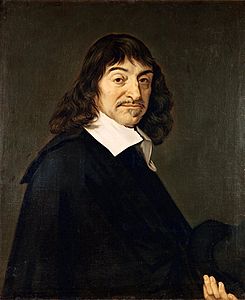March 31: René Descartes
René Descartes (1596)
It was on this date, March 31, in 1596, that the French mathematician and philosopher René Descartes was born in Touraine, France. Descartes was educated in Scholasticism at a Jesuit college in Anjou until age 18, took a law degree at Poitiers in 1616, served in the military, then studied mathematics and mechanics under the self-taught Dutch scientist Isaac Beeckman. The offspring of a wealthy family, from 1620-1628 Descartes traveled throughout Europe.
Hoping to settle in a country where his philosophy would not cause him too much ecclesiastical enmity, he chose the country of his mentor, Holland. There he began a treatise on physics and cosmology entitled Le Monde, ou Traité de la Lumière (The World, or Treated Light). In it, he claimed that there was no difference between terrestrial and celestial phenomena; essentially the earth was only one part of a uniform universe obeying uniform physical laws. He had nearly completed the work in 1633 when news reached him of Galileo's house arrest in Italy. Both Descartes and Galileo supported the sun-centered arrangement of the cosmos.
Fearing for his own safety, even in the relatively tolerant Netherlands, Descartes' World was not published until 1664, 14 years after his death.
As Descartes wrote,
... in order to express my judgment more freely, without being called upon to assent to, or to refute the opinions of the learned, I resolved to leave all this world to them and to speak solely of what would happen in a new world, if God were now to create ... and allow her to act in accordance with the laws He had established.
Though he professed all his life to be an orthodox Catholic, after 20 years in Holland, official suspicions were mounting against the philosopher, so in the last year of his life, Descartes accepted an invitation from Queen Christina to reside in Sweden. It was in Stockholm that the Father of Modern Philosophy died from pneumonia on 11 February 1650.
As a philosopher, Descartes reasoned from the principle that nothing can be believed to be true until it is evidently true. The only assumption he would allow was his own existence, hence his most famous quote from his most famous work, the Discourse on Method of 1637. When he stipulated cogito ergo sum, "I think, therefore I am," he established the first principles of the Cartesian system of philosophy, which eventually killed and buried the Scholasticism taught to him by the Jesuits.
In his Discourse on Method, Descartes elevates education and intellect over superstition, saying, "It is not enough to have a good mind. The main thing is to use it well." René Descartes, born on this date in 1596, was the virtual founder of modern science and philosophy.
Originally published March 2003 by Ronald Bruce Meyer.


